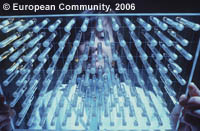ITRE committee votes on FP7 budget and ethics
The European Parliament's Industry, Research and Energy (ITRE) Committee has adopted compromise amendments on the budget for the Seventh Framework Programme (FP7) and the breakdown of the funding. The committee also clarified which areas will not receive funding for ethical reasons. MEPs brought the research programme in line with the agreement on the Financial Perspectives for 2007 to 2013, reducing the budget from the proposed 72.726 billion euro to 50.524 billion. The reduction in the overall budget has meant cuts for every section of the programme, although the Parliament has indicated which areas it considers priorities by cutting some budget lines by more than others. For example, the funding for the nanosciences, nanotechnologies, materials and new production technologies area has been cut by 29 per cent to 3.467 billion euro, while the budget for energy research has been cut by only 18.6 per cent, to 2.385 billion euro. The Commission's Joint Research Centre (JRC) will no doubt be pleased with its new budget for non-nuclear activities, which was cut by only 3.6 per cent. The ITRE committee also discussed the ethical aspects of FP7, and MEPs added amendments to clarify which areas should not receive EU funding. The original proposal stated that research activities supported by FP7 should respect fundamental ethical principles, including those reflected in the Charter of Fundamental Rights of the European Union, and that the opinions of the European Group on Ethics in Science and New Technologies will be taken into account. The ITRE committee's version lists the following areas of research as not supported: human cloning; heritable modifications of the human genome; and production of human embryos solely for stem cell procurement. It adds that: 'Research on the use of human stem cells may be financed under this framework programme, depending both on the contents of the scientific proposal and the legal framework of the Member State(s) involved.' In addition, the committee agreed that researchers and institutions must be subject to strict licensing in accordance with the legal framework of the countries involved. An amendment to review research in these areas was also introduced. The ITRE committee's amendments on the FP7 proposal will now be put to the European Parliament. A vote is expected to take place in June.



